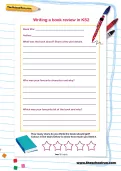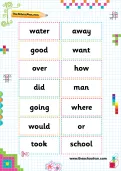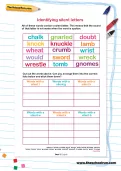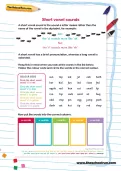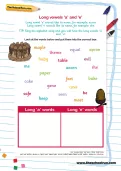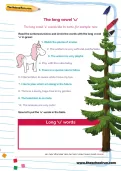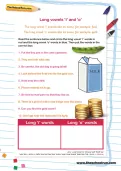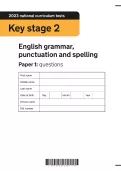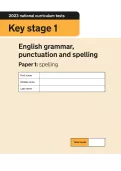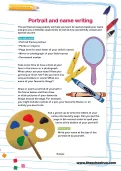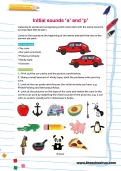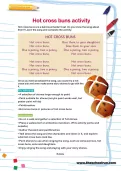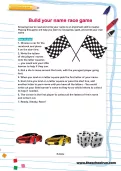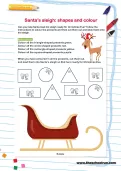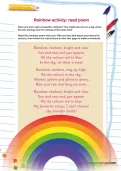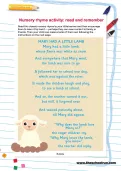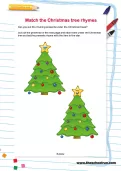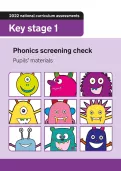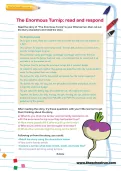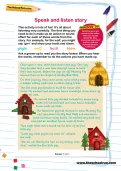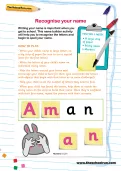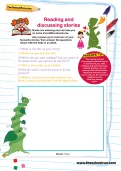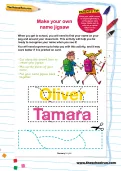A short vowel sound is pronounced for a shorter time than a long vowel sound. For instance, in the word fat, the vowel 'a' is short, but in fate, it's long. Use this worksheet to practise short vowel sounds and consolidate your child's phonics learning at home.
or
Register to add to your saved resources
A long vowel is pronounced for a longer time than a short vowel sound. In the word mat, the vowel 'a' is short, but in mate, it's long. Use this worksheet to practise the long vowel sounds 'a' and 'e' and consolidate your child's phonics learning at home.
or
Register to add to your saved resources
Long vowels are vowel sounds that are pronounced for a longer time than short vowels. In the word cut, the vowel 'i' is short, but in cute, it's long. Use this worksheet to practice the long vowel sounds 'u' and consolidate your child's phonics learning at home.
or
Register to add to your saved resources
Long vowels are vowel sounds that are pronounced for a longer time than short vowels. They can change the meaning of words. In the word bit, the vowel 'i' is short, but in bite, it's a long vowel sound. Use this worksheet to practice long vowel sounds 'i' and 'o' and consolidate your child's phonics learning at home.
or
Register to add to your saved resources
Help your child prepare for the Year 6 English SATs, taken at the end of Key Stage 2, with some revision and at-home practice. These KS2 SATs past papers from 2023 are the official past papers from the Department for Education, used in schools.
or
Register to add to your saved resources
Help your child prepare for the English KS1 SATs, taken at the end of Year 2, with some at-home practice. These complete Y2 SATs past papers from 2023 are the official Department for Education papers used in schools.
or
Register to add to your saved resources
This portrait and peg activity will help you learn to read and spell your name and give you a fantastic opportunity to look at how wonderfully unique and special you are.
or
Register to add to your saved resources
Listening to words and recognising which ones start with the same sound is an important skill to learn. Listen to the sounds at the beginning of the words and park the cars in the correct car park.
or
Register to add to your saved resources
Hot cross buns are a delicious Easter treat. Do you know the song about them? Learn the song and complete the activity.
or
Register to add to your saved resources
Knowing how to read and write your name is an important skill to master. Playing this game will help you learn to recognise, spell, and write your own name.
or
Register to add to your saved resources
Can you help Santa load his sleigh ready for Christmas Eve? Follow the instructions to colour the presents and then cut them out and stick them onto the sleigh.
or
Register to add to your saved resources
Have you ever seen a beautiful rainbow? You might see one when there are lots of sunshine and rain showers in the same day. Read this rainbow poem with your little one and talk about your favourite colours, then follow the instructions to make a windsock.
or
Register to add to your saved resources
Read this classic nursery rhyme to your little learner and then encourage them to learn it by heart — perhaps they can even recite it to family or friends. Then your child can make a lamb of their own following the
instructions.
or
Register to add to your saved resources
Can you put the rhyming presents under the Christmas trees? Cut out the presents and stick them under the Christmas tree so that the presents rhyme with the item in the star.
or
Register to add to your saved resources
The Y1 Phonics screening check is used to test children's reading and phonics skills and what they've learnt in their first two years at school. Get an idea of what your child will be asked to do in the June test by looking through the official past paper for 2022.
or
Register to add to your saved resources
Read the story of “The Enormous Turnip’ to your little learner, then cut out the story characters and retell the story.
or
Register to add to your saved resources
This activity is lots of fun! It’s all about listening very carefully. You are going to make up some actions or sound effects for words in a story. Then, when you hear the words, remember to do the actions you have made up.
or
Register to add to your saved resources
Already a subscriber? to view this content.
Writing your name is important when you get to school. This name builder activity will help you to recognise the letters and begin to spell your name.
or
Register to add to your saved resources
Already a subscriber? to view this content.
Books are amazing and can take you on some incredible adventures. Ask a grown-up to read one of your favourite stories, then see if you can answer some questions with the help of an adult.
or
Register to add to your saved resources
Already a subscriber? to view this content.
When you get to school, you will need to find your name on your peg and around your classroom. This activity will help you be ready to recognise your name when you see it!
or
Register to add to your saved resources
Already a subscriber? to view this content.
